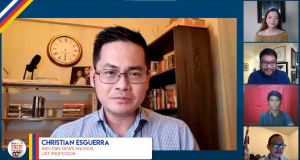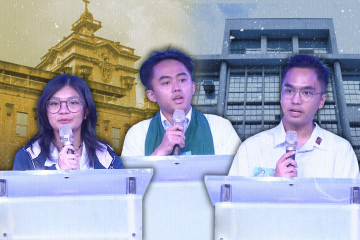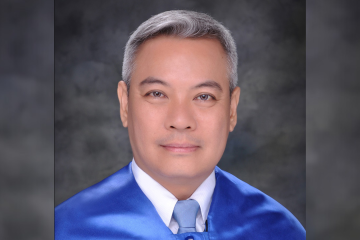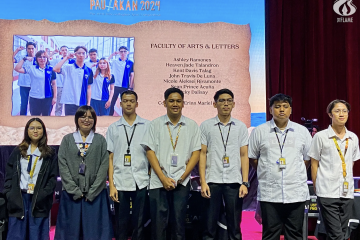
JOURNALISM PROFESSORS and media professionals have urged the youth to educate voters who have lost faith in the electoral process and to scrutinize the statements of candidates running for office.
ABS-CBN News Channel anchor and UST journalism professor Christian Esguerra said the youth’s role in the upcoming elections is significant because they can help other voters come up with informed decisions.
“Malaki ang role niyong kabataan [sa eleksyon] kasi kayo ang magtuturo doon sa mga botanteng naging cynical na. You can help guide them, even your parents [and] the elders (The youth has a big role in the elections because you will teach voters that have become cynical. You can guide them, even your parents and the elders),” Esguerra said during the Boboto AKO sa 2022 webinar last Wednesday.
UST Journalism coordinator and PressOne.PH editor Felipe Salvosa II said one of the ways of encouraging the youth to be educated politically is gathering campus news organizations to fact-check statements of politicians during important events such as the elections.
“Bilang mga edukador — lalo na ng mga future mamamahayag — sa tingin ko nakaka-contribute naman tayo in a way to the education of future responsible citizens (As an educator — especially to the future journalists — I think we contribute in a way to the education of future responsible citizens),” he said.
Esguerra reminded the youth to be knowledgeable and discerning about the background of candidates running for office.
“Kilatisin niyo talaga yung mga kandidato, huwag tayo magpapauto. Siyempre mahirap mangilatis kasi dadaan pa din tayo sa mga news organizations [or] news coverage na talaga namang, to a large extent, kontrolado ng mga operators [or] mga propagandists (You have to examine the candidates thoroughly. Do not allow them to fool you. Of course, it is hard to examine them because we have to go through news organizations or news coverage that are to a large extent controlled by operators or propagandists),” Esguerra said.
“You have to be very very discerning and let the legitimate news organizations and journalists guide you,” he added.
Critical vs. biased reporting
Journalists should also manage their biases or opinions and must avoid incorporating them in reporting to uphold the duty of being objective and advocates of truth, Esguerra said.
He also emphasized the need to criticize the wrongs in society by asking critical questions.
“Ang problema minsan sa mga tao, even from within our ranks — kasama na rin yung mga news organization owners [or] yung mga news business people — they tend to misconstrue hardcore reporting [and] hardline journalism as biased journalism (The problem with people, even within our ranks — including news organization owners or news business people — is that they tend to misconstrue hardcore reporting and hardline journalism as bias journalism),” he said.
Journalists who report critically about a government policy would often be presumed as being “biased” due to people overlooking the important role of journalism in democracy, Esguerra explained.
“A lot of these criticisms against journalism doing their job are rooted in ignorance or misappreciation of what journalism is all about,” he added.
National Union of Journalists of the Philippines chairman Jonathan de Santos said journalists are often urged to write positive stories about government officials to balance the news.
However, journalists are not out to look for positive stories, but to search for newsworthy angles, Salvosa said.
Ethical election coverage
Highlighting the need for reporters to remain independent, Salvosa cited a proposal of Philippine Press Institute to revise the code of ethics for election coverage that laid out the “pay your way” principle.
The principle requires the news organization to cover the cost of election campaign coverage such as airfare, hotel accommodation, and operation expenses of staff members assigned to political parties and candidates to avoid conflict of interest. It also persuades members of the media covering campaign sorties to decline any transport services and accommodations arranged by political parties.
“’Pag ginawa mo ‘yun — sa lingwahe naming mga dyarista — hindi ka makakabanat
(If you do that — as news writers — you will not be able to write openly),” Salvosa said.
“Pay your way” also requires staff members to clarify with their supervising editors which events are newsworthy so they can prepare an appropriate budget.
If the staff members cannot “pay their own way,” they have to disclose that they went to an event at the candidate or the political party’s expense, de Santos said.
The webinar is the fifth episode of Boboto AKO sa 2022: An Online Talakayan Series, which tackled the role of media during elections. F – J. Moises



